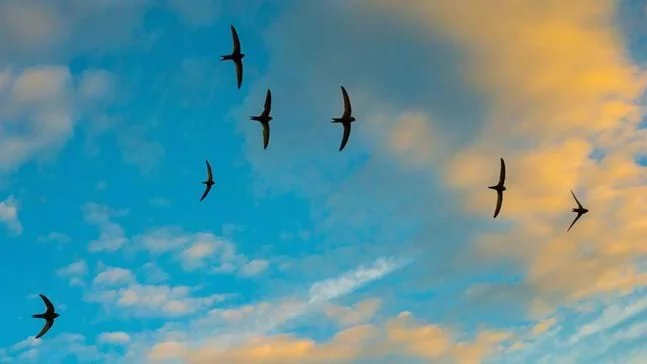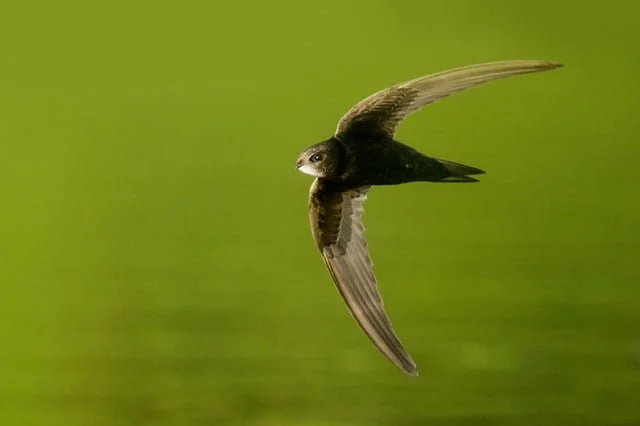How swifts show us utopian pedagogy
Just over a month ago I took the step of joining the Order of Bards, Ovates and Druids, and am currently doing the Bardic grade course. Why? I’ll write more about my motivation another time, but for this moment, I’ll just say that I believe that this enables me to better serve youse in your quests towards your ideal societies and visions for the planet,and those of your clients and participants.
Yeah, I want to help you move toward your utopia, dear reader.
Nature’s wheel of the year
First a bit of background: The Rhod y Flwyddyn (wheel of the year) contains celebrations to mark either changes in our relationship with the sun (the most famous being the solstices) or the seasons. In each of them, meaning is found, and in marking the circles of nature, we can take strength and solace, as well as connecting ourselves to nature more.
My intuition is that we can find meaning not just in these bigger steps along the wheel, but also through small steps, such as when lilac starts to bloom, or the first buzzing of a bee, the arrival of the singing of skylarks, the two weeks of the call of the cuckoo, and, as I saw a few days ago, the first sight of a dragonfly.
Whatever your desire is for societies and the planet, your ideal state that you wish, whatever your work is, I believe that these small steps can help us, if we make a little effort to either see whether tradition and mythology can give us insights, or make up our own mythology to serve our ends! Join me then as I consider a recent step, and let’s work out together what it can mean for our utopias.
A recent step along the wheel
Right now as I write this I can see and hear for the first time another step along the path to warmer weather: the swift. They are currently doing the common thing of circling in groups, screaming their way around the backyard.
I don’t want to focus on that though, rather, on what I saw last Thursday, where I stood on the balcony and saw one solitary swift flying around. It wasn’t screaming. It was simply seemingly having a look around, and it would occasionally fly to an area between a roof and a wall, maybe seeing whether a nest could be made there.
One solitary swift.
If one sees a solitary swallow in, say, April, one says “one swallow doesn’t make a summer”. That step in the Rhod is more well-known and one can say a lot about how events don’t mean a trend (maybe I’ll write about that at a later date). But what can we say about the solitary swift?
What do you think? Take a moment now and picture that one bird in your mind, flying between buildings, checking out the local landscape. What meaning can we take from that?
I’m asking you, as I think that mythologies can, like the wheel of the year, help us connect to nature in a deeper way. Therefore it behoves us to see what myths exist around swifts, and then see what that means for utopia.
Is there a mythology about swifts?
The latin word for swifts is apus apus, which has its etymology in the ancient Greek word ἄπους (apous) meaning “without feet”. So there’s one thing. Another is that in Britain they were apparently known as the “devil’s bird”. I say apparently, because I don’t find sources for this. Likewise, I have found some claims made about beliefs regarding swifts, such as that they were considered to be the souls of the dead, hence the screaming, or even that Bendigeidfran, a key character in one of the stories in the Mabinogi (a collection of stories that are essential to mythology in Cymru) travelled with them to the Otherworld, but I don’t find sources for these claims, among the cultures I am either part of or am pretty close to, Cymraeg (or “Celtic”), Germanic or Slavic. (Maybe you know some, if so, please write them as a comment in the place I shared this article)
With that perceived lack of a big mythology about them, but holding on to the notion that they are “without feet” and are the “devil’s bird”, let’s meditate ourselves on what we can perceive. Here’s my contribution: the word forerunner comes to my mind. One bird coming alone to check out a local area. Ahead of the others. For the others? Reconnaissance?
I remember an experience about 11 years ago, when I worked with a colleague who texted me about their partner, using “they” as their pronoun, and I was like “they”?
Now of course we’re at the stage where more people are aware that having a non-binary gender exists, and that using “they” as a self-designated happens. My colleague was ahead of me. She was the swift going into an area I hadn’t gone into yet.
What that solitary swift means for our work
Sometimes we who work in education have gone into areas that others, be they our colleagues, participants, or employers haven’t gone into yet*. We can play the role of forerunners for people. Sometimes it’s like when one goes on a walk through a meadow, and are not sure whether the path is, but one sees that other people have walked a certain way before, so one finds that path.
Let’s come back to “without feet” or “devil’s bird” though. While sounding different, I can see a similarity between those two descriptions. I can perceive here something always on the move (which swifts are), something that is both here and not from here, something in a liminal space (between places), something dark, something that can appear dangerous because they don’t keep to one place, something that is as a consequence outside of the in-group, something that is dangerous.
The call towards utopia isn’t always one which is heeded. It’s not always liked. It’s not always popular. Opening advocating for societies more in line with our values means calling into question that which we currently have.
Maybe we can say that swifts tell us pedagogues:
Be a forerunner into the unknown (who knows whether they still build nests there);
Being a forerunner means soaring the skies, forging new paths, checking new ground;
Being misunderstood as the devil, being seen to be a danger.
And yes, sometimes those of us who seek to work for common utopias face all kinds of opposition. One can relate this to the “outsider” nature of swifts (not having a concrete place to live), in that those of us affected by discriminatory structures can have utopias that are scary for others.
The call of the solitary swift
That’s our call though. Both to heed the swifts of our lives, those who have less power, less money, are not dominant in the hierarchies of our societies and work. Reading literature or watching videos by people who are affected by, say, classism, racism, sexism, ableism, climate change, can really help us here. Listening to our/their visions of better societies and global relations, even if at first we may think of the visions as the “devil’s bird”. Incorporating their visions into our work, both by reflecting on them and allowing them to influence our work, but also by passing on their visions.
That involves critical consciousness, but for our utopias we also need utopian consciousness. What do I mean by that? Look at this video of flying swifts.
Look at that beautiful flying, the freedom that it flies in, the confident call, the easy movement. The swift is totally a swift, it’s not pretending to be a swallow, or a goldfinch. It is being itself. That’s all it can do. In my utopian pedagogy I hear from my participants about visions where people can be themselves, can explore what that means, that one can chose what one does with ones life. We have to give space to our participants/clients to explore new skies, to heed their own inner swifts, their utopian calls.
The solitary swift may seem like a danger, but it’s part of nature. It’s part of life. It’s flexibility. It’s free. Change can be scary, but it happens all the time. It’s what you’ve been doing since you were a foetus. It’s life.
Take heed then, not just to external call of the swift, but to your own inner call towards your own visions, your “unrealistic”, “wild” desires, an inner call that maybe you repress. The swift is authentic'; be authentic to yourself. By doing that, you can help your participants/clients to be authentic in their utopian expression.
There we are then. How about you go outside and watch the flight of the swift, if there are any by you?
* The issue of power may come into your mind. The suggestion that pedagogues know better, are more reflected, are more knowledgeable than their participants, can raise opposition. Certainly, I try to work in a non-hierarchical way, sometimes contrary to my participants accustomed to formal learning. While my utopia is of non-hierarchical learning, I consider it to be prudent that certain people can guide, and can have more knowledge or be more reflected about certain things, at least in that moment.


